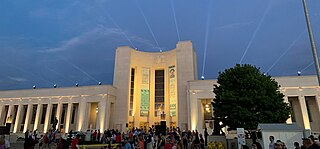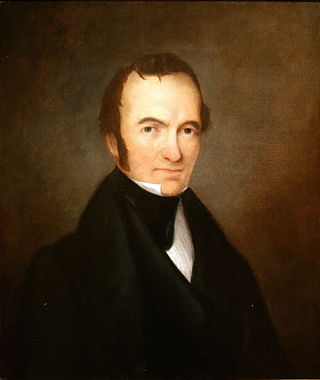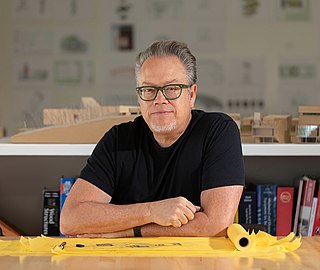
Travis County is located in Central Texas. As of the 2020 census, the population was 1,290,188. It is the fifth-most populous county in Texas. Its county seat and most populous city is Austin, the state's capital. The county was established in 1840 and is named in honor of William Barret Travis, the commander of the Republic of Texas forces at the Battle of the Alamo. Travis County is part of the Austin–Round Rock–Georgetown Metropolitan Statistical Area. It is located along the Balcones Fault, the boundary between the Edwards Plateau to the west and the Blackland Prairie to the east.

The following is an alphabetical list of articles related to the U.S. state of Texas.

The Hall of State is a building in Dallas's Fair Park that commemorates the history of the U.S. state of Texas and is considered one of the best examples of Art Deco architecture in the state. It was designed and built for the Texas Centennial Exposition.

Nicholas Joseph Clayton was a prominent Victorian era architect in Galveston, Texas.

David Heymann is an American architect, writer, and educator. He is most known for his 1988 design of an environmentally friendly house for then Governor of Texas, George W. Bush, and Laura Bush for their Prairie Chapel Ranch near Crawford, Texas. Heymann is a contributing writer for Places Journal. In 2014 he published a book of short stories, My Beautiful City Austin. He is currently the Harwell Hamilton Harris Regents Professor at University of Texas at Austin School of Architecture.

After declaring its independence from Mexico in March, 1836, the Republic of Texas had numerous locations as its seat of government. This being seen as a problem attempts were made to select a permanent site for the capital. January, 1839, with Mirabeau B. Lamar as the newly elected president, a site selection commission of five commissioners was formed. Edward Burleson had surveyed the planned townsite of Waterloo, near the mouth of Shoal Creek on the Colorado River, in 1838; it was incorporated January 1839. By April of that year the site selection commission had selected Waterloo to be the new capital. A bill previously passed by Congress in May, 1838, specified that any site selected as the new capital would be named Austin, after the late Stephen F. Austin; hence Waterloo upon selection as the capital was renamed Austin. The first lots in Austin went on sale August 1839.
Harwell Hamilton Harris, was a modernist American architect, noted for his work in Southern California that assimilated European and American influences. He lived and worked in North Carolina from 1962 until his death in 1990.

John Fanz Staub was an American residential architect who designed numerous traditionally-styled homes and mansions, mostly in Houston, Texas from the 1920s to 1960s. He was a grandson of Peter Staub, who served as U.S. consul to St. Gallen, Switzerland.

The University of Texas at Austin School of Architecture (UTSOA) is a college within The University of Texas at Austin, with its major facilities located on the main university campus in Austin, Texas, United States.
The architecture of the U.S. state of Texas comes from a wide variety of sources. Many of the state's buildings reflect Texas' Spanish and Mexican roots; in addition, there is considerable influence from mostly the American South as well as the Southwest. Rapid economic growth since the mid twentieth century has led to a wide variety of contemporary architectural buildings.

Alfred Charles Finn was an American architect. He started in the profession with no formal training in 1904 as an apprentice for Sanguinet & Staats. He worked in their offices in Dallas, Fort Worth, and Houston. His credits during his tenure residential structures, but firm was a leader in steel-frame construction of skyscrapers.

Dick Clark + Associates, formerly known as Dick Clark Architecture, LLC is an Austin, Texas-based architectural firm.
Hugo Franz Kuehne was an architect and city planner who practiced in Austin, Texas.

The Robert A. Welch Hall is a building located on the University of Texas at Austin campus in Austin, Texas, United States.
John Saunders Chase Jr. was born in Annapolis, Maryland, to John Saunders Chase and Alice Viola Hall. He was an American architect who was the first licensed African American architect in the state of Texas. He was also the only Black architect licensed in the state for almost a decade. He was also the first African American to serve on the U.S. Commission of Fine Arts, which reviewed the design for the United States Vietnam Veterans Memorial.

Eugene Thomas Heiner was an American architect who designed numerous courthouses, county jails, and other public buildings in Texas. He was born in New York City, apprenticed in Chicago, and studied further in Germany. His works includes buildings listed on the U.S. National Register of Historic Places.

Charles Henry Page (1876–1957) was an American architect. He and his brother Louis Charles Page (1883–1934) founded the Texas firm of Page Brothers, Architects. The firm achieved great recognition when they were commissioned to design the Texas State Building for the 1904 Louisiana Purchase Exposition. The Pages also designed many courthouses and other buildings across Texas.

Marlon Blackwell is an American architect and university professor in Arkansas. He is a Fellow of the American Institute of Architects.

The Austin United States Courthouse is a federal courthouse in downtown Austin, Texas. Built between 2009 and 2012, the building houses the Austin division of the United States District Court for the Western District of Texas and other federal judicial offices. It replaced the 1936 Austin U.S. Courthouse, which has since been transferred to Travis County to hold county judicial space.

Page, legally Page Southerland Page, Inc., is an architecture and engineering firm currently headquartered in Washington, DC. In revenue, it is ranked as one of the largest architecture firms in the United States.















